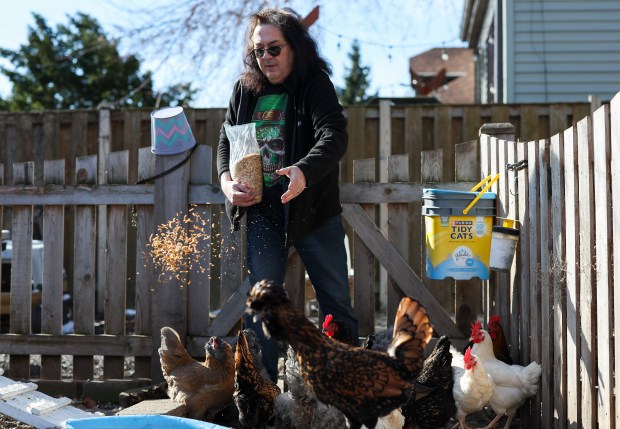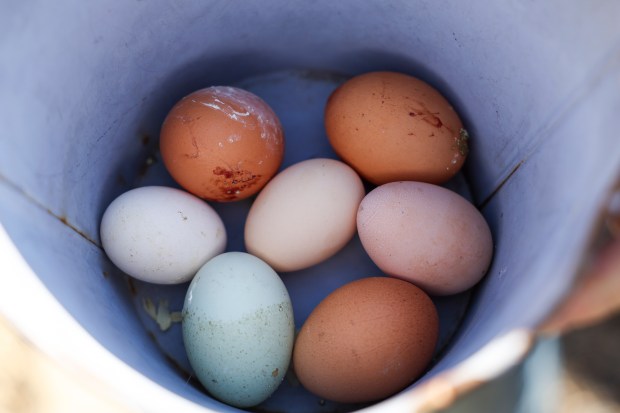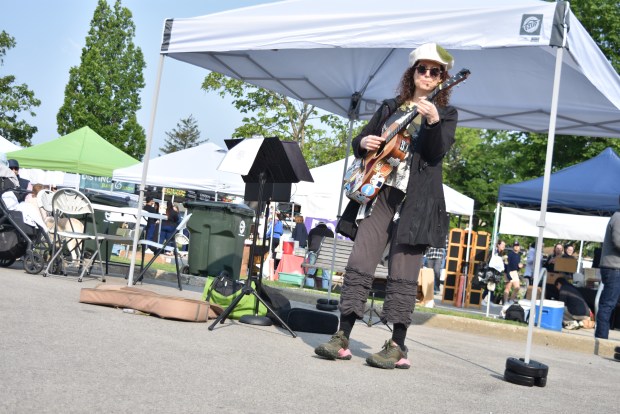As Chicago-area shoppers hesitate to reach into grocery coolers when they see the price of eggs, Jim Irwin enjoys going out to his backyard chicken coop on Chicago’s Northwest Side, and Annie Lawson gathers freshly laid eggs in her Grayslake yard.
Winfield resident Sheena Tovt wishes she were so fortunate.
In west suburban Winfield, residents are banned from raising livestock. Amid soaring egg prices, however, the town held an advisory referendum April 1 on whether the village should rethink its policy on backyard chickens.
The non-binding measure to allow chickens lost by just 51 votes, according to unofficial results. Village President Carl Sorgatz said Winfield put the question on the ballot because the issue has inspired a lot of passionate debate in town.
Despite the pro-poultry contingent’s loss, Sorgatz said the Village Board still may reconsider the current ban.
“We’ll take a look at it in future board meetings to see whether the board might be willing to move forward in terms of changing the position we have,” he said.
That should be welcome news for Tovt, who has been pushing for backyard chickens in her community. The current egg prices played a part in her decision, especially because she buys the organic, pasture-raised eggs that carry a premium price in supermarkets.
“There are a lot of people in our community now wanting chickens, and egg prices are absolutely part of the discussion,” she said. “Long term, you are going to recoup your money, especially if you want cage-free, pasture-raised eggs from a chicken that’s not sick or stressed. And you’re not at the mercy of grocery stores’ pricing and availability.”
Tovt also saw the educational benefits when her son, at about age five, interacted with chickens being raised at his school, Carmel Montessori Academy in Warrenville.
“He was able to see the coop, gather the eggs, bring one home, cook it and eat it,” she said.
Tovt said she believes the “no” votes in her town’s referendum came from people who live in subdivisions with homeowners associations that prohibit chickens regardless of village law. She was heartened to see that 1,079 people — about 49% of voters — backed the idea.
“The referendum was to gauge support and interest and you definitely can see support and interest,” she said. “I’m just waiting to see if we can move forward.”
Though experienced chicken owners caution that the cost of raising chickens might cancel out any egg savings at the supermarket, they encourage the public to give the hobby a try. They say it’s entertaining to raise the birds, who become kind of like pets, with their own personalities and quirks.
“It’s just very rewarding, hands-on — it’s great for kids,” said Lawson, adding that children in her Grayslake neighborhood love to watch the birds. “It’s just a fun community thing.”
Irwin, who lives in the North Mayfair section of Chicago’s Albany Park neighborhood, works as an IT professional and moonlights as a singer in an AC/DC tribute band. He said he collects three to five dozen eggs a week for his family and sometimes friends and neighbors, too.
“They’re personable animals, they’re inquisitive and they have a personality,” he said. “They’re fun to interact with.”
Combating bird flu
Stories about bird flu decimating poultry farms and causing jumps in egg prices have been all across the news in recent months.
Numerous dead birds that tested positive for avian flu, mostly ducks and waterfowl, have been found on Chicago’s North Shore lakefront. Betty Brucato, an Evanston resident who has owned chickens for 11 years, said she has not had any problems with her chickens, but she is worried.
Her hens are on lockdown, she said, with no yard time at all. She wears separate boots when walking in their run, and she plans to put up some barriers along the bottom to prevent wild bird exposure.
“We have had many bird flu scares in the past, but never to this frightening extent. I hope this too passes,” Brucato said.
Joy O’Keefe, an associate professor and wildlife extension specialist at the University of Illinois Urbana-Champaign, said the risk of bird flu for backyard chickens depends on a few factors.
The greatest risk is if waterfowl, like ducks and geese, are making stops in the same yard, potentially allowing interactions between chickens and wild birds.
Wild birds are the primary spreader of bird flu at this point, but the transfer to poultry poses some risks for other animals. O’Keefe said she’s heard of cases of bird flu spreading to cats and advised people to keep their dogs away from dead birds to protect against another potential species transfer.
She advised containing the chickens as much as possible, especially their feeding area.
The big risk with bird flu is when it begins jumping more between different types of animals, O’Keefe said. While chickens are closely related to wild birds, a mutation could make it transferable between humans.
It’s critical to have proper surveillance and monitoring to help prevent the spread of the disease, O’Keefe said. Such measures have come under threat with recent federal funding cuts, she said, and the risks could be enormous.
“This is critical,” O’Keefe said, pointing to the COVID pandemic. “Thousands if not millions (of people) could be killed from one of these viruses. We’re not at that stage with bird flu at all, but to prevent us from getting there, we need to have regular funding for these agencies that can work on the various angles of this that help protect people.”
For now, Brooke Bestwina, who with her sister Blair runs The Feed Store in southwest suburban Summit, offered a practical tip for chicken owners to help prevent bird flu. She recommended covering chicken runs with hardware cloth, a type of metal mesh. It prevents wild birds from landing amidst a flock of chickens to spread avian flu, she said, and also protects the chickens from predators.
‘Get three or four and enjoy it’
In Irwin’s backyard, he and his family have 15 hens and a rooster. There is a punny sign proclaiming the setup “Coop DeVille.” Irwin recently said he has nine dozen eggs, of various colors, in his refrigerator.
He said he enjoys owning a variety of chicken breeds, including silkies, which he described as tiny, fluffy and “are friendly and do a little dance.”

Then there are what he called Polish chickens, which have a crown of crested fluffy feathers on their heads, kind of like Big Bird, but in various colors.
He’s fond of all of them.
“A chicken will lay eggs for about five years,” he said. “Get three or four of them and enjoy it.”
Towns that do and don’t allow chickens
The following lists, though far from exhaustive, indicate some Chicago-area municipalities and counties which do or don’t allow residents to keep backyard chickens. Most of the towns do not allow roosters, require minimum lot sizes and put a limit on the number of hens allowed. Others require that the chicken coop and run be located a certain minimum number of feet away from the property line, i.e., the neighbors. Check your specific municipality to find out the requirements.
Towns and counties that allow residents to keep backyard chickens:
Bartlett, Batavia, Bensenville, Berwyn, Burr Ridge, Chicago, Darien, Des Plaines, Downers Grove, Elgin, Evanston, Fox Lake, Glencoe, Grayslake, Highland Park, Homewood, Lisle, Lombard, Long Grove, Mundelein, Naperville, Northbrook, Palatine, Oak Park, Orland Park, Schaumburg, St. Charles, Tinley Park, Unincorporated Lake County, Unincorporated DuPage County, Villa Park, Warrenville, Westmont.
Towns which prohibit residents from keeping backyard chickens:
Arlington Heights, Aurora, Barrington, Cicero, Elk Grove Village, Hoffman Estates, Lincolnwood, Glenview, Joliet, LaGrange, Morton Grove, Mount Prospect, Niles, Oak Lawn, Park Ridge, Round Lake Beach, Wilmette, Winfield.





